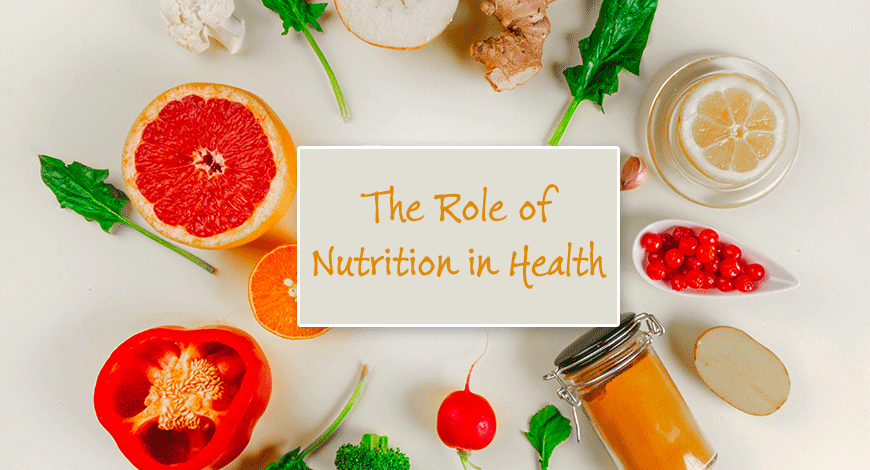Part 1: Introduction to Nutrition
What is Nutrition?
Nutrition refers to the process by which our bodies take in and utilize the food and nutrients necessary for growth, maintenance, and overall well-being. It plays a vital role in supporting bodily functions, enhancing physical performance, and maintaining optimal health.
Essential Nutrients for the Body
The human body requires a variety of nutrients, including:
- Proteins: Essential for building and repairing tissues.
- Carbohydrates: The primary source of energy for daily activities.
- Fats: Important for energy storage, hormone production, and cell function.
- Vitamins and Minerals: Crucial for immune function, bone health, and metabolic processes.
- Water: Vital for hydration, digestion, and temperature regulation.
Each of these nutrients plays a specific role in maintaining a balanced and healthy body.
Part 2: The Role of Nutrition in Health

Nutrition and Development
Proper nutrition is fundamental for physical and mental development. In children, it supports growth, cognitive function, and immune system health. For adults, it ensures sustained energy levels and prevents premature aging.
Nutrition and Disease Prevention
A balanced diet can help prevent chronic illnesses such as cardiovascular diseases, diabetes, and certain types of cancer. Nutrients like antioxidants, fiber, and healthy fats reduce inflammation and improve overall health.
Nutrition and Mental Health
There is a strong link between diet and mental well-being. Consuming nutrient-rich foods supports brain health, stabilizes mood, and reduces the risk of mental health disorders like anxiety and depression.
Part 3: Building a Healthy Diet
Principles of a Healthy Diet
- Variety: Incorporate diverse food groups to ensure all nutrient needs are met.
- Balance: Maintain a proportionate intake of proteins, carbohydrates, and fats.
- Portion Control: Avoid overeating by monitoring portion sizes.
Key Food Groups
- Vegetables and Fruits: Rich in vitamins, minerals, and antioxidants.
- Whole Grains: Provide complex carbohydrates and fiber.
- Protein Sources: Lean meats, fish, eggs, legumes, and nuts.
- Dairy: Supplies calcium and vitamin D.
Tips for a Healthy Diet
- Opt for fresh, unprocessed foods.
- Choose simple cooking methods such as steaming or grilling.
- Limit consumption of fast foods, sugary drinks, and high-fat snacks.
Part 4: Common Nutritional Challenges

Nutritional Deficiencies
Deficiencies in vitamins or minerals, such as iron deficiency anemia or vitamin D deficiency, can lead to various health problems. Address these issues by consuming a nutrient-rich diet or supplements if necessary.
Eating Disorders
Conditions like anorexia, bulimia, or binge eating are increasingly common. Early recognition and intervention, along with education about balanced eating habits, are critical in managing these disorders.
Special Nutritional Needs
Certain groups, such as pregnant women, children, seniors, and individuals with chronic illnesses, have unique nutritional requirements. Tailoring diets to meet these needs ensures better health outcomes.
Part 5: Practical Advice and Conclusion
Practical Tips for Healthy Eating
- Develop consistent meal schedules.
- Focus on mindful eating to avoid overeating.
- Drink plenty of water and reduce sugary beverages.
- Include physical activity as part of a healthy lifestyle.
Conclusion
Understanding nutrition is key to protecting your health and enhancing your quality of life. By adopting healthy eating habits and staying informed, you can improve not only your well-being but also that of your family. Embrace the knowledge of nutrition as a powerful tool for a healthier and happier life.
By prioritizing proper nutrition, you invest in long-term health and disease prevention. A balanced diet rich in essential nutrients fosters physical, mental, and emotional well-being. Additionally, cultivating healthy dietary habits can set a positive example for others, encouraging a broader culture of wellness within your community.
Nutrition is not just about what we eat; it’s about how we understand and appreciate the connection between food and health. As we make informed choices, we empower ourselves to live more energetic, productive, and fulfilling lives. Take small, consistent steps toward a healthier lifestyle, and remember: every meal is an opportunity to nourish your body and mind.



